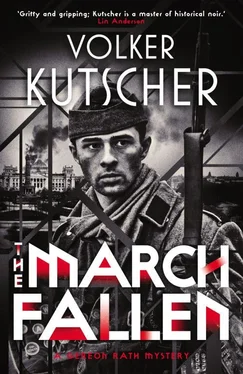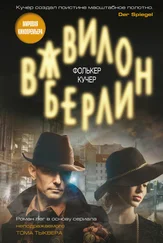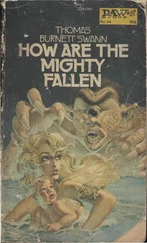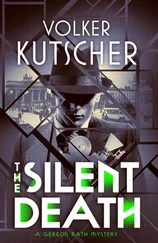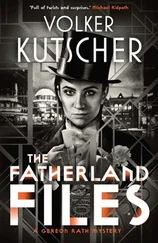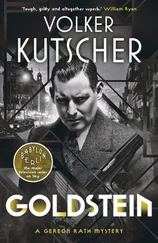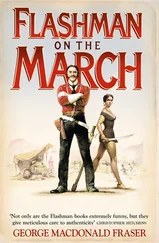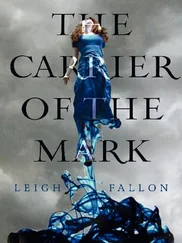Volker Kutscher
THE MARCH FALLEN
I could not possibly eat as much as I would like to throw up.
Max Liebermann , upon seeing the torchlight procession make its way through the Brandenburger tor on the evening of 30th January 1933
PART I
FIRE
Saturday 25th February to
Thursday 2nd March 1933
A faithful soldier, without fear,
He loved his girl for one whole year,
For one whole year and longer yet,
His love for her, he’d never forget.
‘DER TREUE HUSAR’, 18th CENTURY GERMAN FOLK SONG
Fire, phenomenon arising from the generation of heat and light. In solids or liquids, ‘glow’; in gases, ‘flame’.
MEYERS GROSSES KONVERSATIONS-LEXICON, 1905
The dead man was propped against a steel pillar in the shadow of the elevated railway line, his chin sunk on his breast as if he were taking a nap. You could be forgiven for thinking he was sleeping it off, huddled as he was in an old, patched soldier’s overcoat, dressed in puttees and holey gloves, a thick woollen hat pulled low over his forehead.
Detective Chief Inspector Wilhelm Böhm clutched his bowler hat to prevent the wind sweeping it off his head. They were directly under the elevated railway at Nollendorfplatz, barely a stone’s throw from the stairway, but no one had noticed the dead man, or, at least, no one who thought it necessary to notify the police. The deceased looked like a tramp, one of the many living rough on Berlin’s streets, whose number swelled with each passing year. Even in this bitter cold, he stank like someone who had been sleeping out for years: stale sweat, urine, alcohol.
Bird droppings covered the lifeless body in a thin, blotchy film, from the shoes up to the woollen hat. Perched on the struts overhead, a colony of pigeons ensured that the surrounding pavement was also soiled. Hardly surprising that most pedestrians passed under the railway line elsewhere.
A uniformed cop on his rounds at Nollendorfplatz had – after how many days? – discovered a pool of blood under the inert body and alerted Homicide at Alex. Sergeant Breitzke’s satisfaction at getting rid of the deceased without having to involve his own precinct was plain to see. No one from the 174th would be scrambling to investigate the death of an unwashed vagrant.
Placing a scarf over his nose and mouth, Böhm examined the corpse. A thin trickle of blood had run from the left nostril onto the pavement, forming a pool that had by now coagulated. Or frozen: at these temperatures it was impossible to say. Blood on the overcoat had seeped into the fabric.
Gingerly, Böhm scoured the dead man’s pockets, finding a ragged old service record, one corner of which was singed, as if its owner had taken a cigarette lighter to it. He unfolded the greasy, worn document. The reservist Heinrich Wosniak, born 20th March 1894 in Hagen/Westfalen, had joined the 1st Guards Reserve Infantry Regiment on the Eastern Front in August 1915, shortly before it was posted to Flanders. He had survived the trenches, only to perish in his soldier’s overcoat.
The majority of Berlin’s beggars wore soldier’s clothing; clothing that the men, often hideously crippled, had kept since the war. Having sacrificed their health for the Fatherland, no one gave a damn. There was little sympathy, and certainly no gratitude, for the men who had risked everything for the patriotism of those left behind…
‘Should I start securing the evidence, Sir?’ Detective Reinhold Gräf blew clouds of breath into the February air.
Böhm hauled himself into a standing position. Away from the dead man he could breathe freely again. ‘Please. Kronberg’s men are still in Wedding, we won’t be seeing them today.’ He gestured towards the evidence kit in Gräf’s hand. ‘We’ll just have to make do with what we have. Take a look around, see if you can’t find something. Cigarette stubs, footprints, that sort of thing. Not much footfall here. Any trace on the pavement could be a clue.’
Gräf put down the case and snapped open the lock. ‘What about fingerprints?’ he asked.
‘Leave that to me, but I wouldn’t get your hopes up. What kind of person leaves the house without gloves in this weather?’ Böhm looked around. ‘Where’s Steinke?’
‘Trying to get the camera out of the boot.’
Gräf took a packet of marking tags and a handful of evidence containers and got down to work; Böhm turned towards the uniformed cop.
‘Heinrich Wosniak. Name mean anything to you?’
‘I don’t know what any of that lot are called.’ The man had a Berlin accent.
‘Then perhaps you’ve seen him before?’
‘Come again?’
‘This is your beat, isn’t it? Maybe you’ve seen him somewhere? Begging, or sleeping on a park bench? Something like that.’
Sergeant Breitzke shrugged. ‘I’d need to take a closer look.’ The dead man’s head was so low on his chest, his matted hair so far over his forehead that his face was barely visible.
‘We can’t move him until the evidence has been secured. You’ll have to wait until then,’ Böhm said.
‘Hold on a minute!’ Breitzke sounded distinctly less bored as he gestured towards the pock-marked skin underneath the dead man’s hat. ‘It could be Kartoffel. He hangs around Nolle, over by the U-Bahn, cadging off passers-by.’
‘I thought you didn’t know what any of that lot were called?’
‘It’s a nickname.’
‘Kartoffel.’ Böhm said. Potato . ‘You don’t know his real name?’
‘Like I just said.’
‘Wait until we’ve finished with the camera. Then see if you’re right.’
Sergeant Breitzke appeared unenthusiastic, but nodded.
Böhm heard someone cursing quietly. Cadet Steinke had an unwieldy camera wedged under his arm, its heavy tripod draped over his shoulder. Böhm doubted whether the law graduate, who had come to the Castle straight from the lecture theatre, would amount to much. After almost nine months he still acted like a novice, except when it came to rank and pay grades. Even so, Steinke had a good chance of passing the year, which would make him a superior of Gräf, who lacked the ambition to sit the inspector’s examination but was a better criminal investigator. Böhm hoped that Steinke would flunk out; there were enough incompetent inspectors at Alex as it was.
‘Steinke, at last!’
‘I feel like a packhorse,’ the cadet said, administering a sharp kick to the dead man.
‘What are you doing?’
‘Checking he’s dead, not just intoxicated.’
‘If he wasn’t dead, we wouldn’t be here,’ Böhm said. ‘Don’t they teach you not to touch anything until the evidence is secured?’
‘Of course, but…’
‘Besides which: how about showing a dead man a little more respect?’
‘Forgive me, Sir, but this is a vagrant, a… down-and-out. I’m wondering why we’re here in the first place.’
‘Are you implying that a man like this doesn’t deserve to have us investigate the circumstances of his death?’
‘I’m just saying.’
‘Well don’t. Concentrate on putting up your camera, and get a move on.’
Steinke opened his mouth to reply just as a train pulled into the station above and drowned him out. He groaned and began unfolding the tripod stand.
Böhm fetched soot powder, brush and adhesive film from the evidence kit, and set about dusting the steel column. He didn’t find any prints near the dead man, but spied three about one and a half metres up, two of them well-preserved and one half-erased. He started transferring the prints onto the film as Steinke clicked the shutter release. The rivets in the steel column reflected the flash, and the garish light made the corpse look wan and dead for the first time, not just drunk.
Читать дальше
